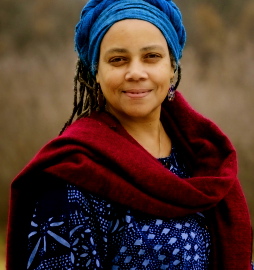Ministry That’s Good for the Soil and Good for the Soul
 Rev. Dele describes herself as “a grandmother, theologian, and Climate Reality Leader who uses her skills as a permaculturist and contemplative to assist churches in training the next generation of mission leaders in faith, ecology, and policy.” One of her projects is a ministry called Soil and Souls. I interviewed Rev. Dele as part of a series of interviews with church leaders who are envisioning and bringing to life new ways of being church while having a notable emphasis on creation care and justice.
Rev. Dele describes herself as “a grandmother, theologian, and Climate Reality Leader who uses her skills as a permaculturist and contemplative to assist churches in training the next generation of mission leaders in faith, ecology, and policy.” One of her projects is a ministry called Soil and Souls. I interviewed Rev. Dele as part of a series of interviews with church leaders who are envisioning and bringing to life new ways of being church while having a notable emphasis on creation care and justice.
1) You have described your ministry as a Community Eco Mission. Can you describe that and what it entails?
Soil & Souls is an emerging global mission enterprise that teaches young adults to grow a green job while making sure their own communities are food and water secure. Components include resilience training in Cuba; installing 4 direction medicine gardens on the grounds of houses of worship; and a wholesale nursery specializing in native plants and woodland medicinals. Preparation of mission leaders entails an introduction to climate realities as well as inner and outer tools for resilience, including nature-based contemplation and permaculture design respectively. Our goal is to train 300 leaders who perform service in 30 locations around the country. The mission projects are based in underserved communities with residents from the community leading food and water system installations as well as ecosystem repair. An intended outcome is to prepare young adults to serve as ecological leaders in their local church and as resilience leaders in their community.
2) How would you paint a picture of a future church or an ideal church that meets the highest of ecological aspirations in its ministries?
This is a wonderful question, because when we answer this question in community, I believe we will not only mature spiritually ourselves, we will create an attractive space that calls young adults back into faith communities. A church that meets high ecological aspirations holds 5 elements in dynamic embrace: Creator, Christ, Holy Spirit, Humanity, and Nature. Mother Nature is integrated into our lives with a permanent seat at the table for the beloved community. She is a participant, if not teacher, for all seasons. Worship is an integral part of work and play outdoors in addition to indoor experiences. Community reflection on these experiences brings clarity to our individual and collective spiritual journeys. Christian education becomes a time when we learn details about the mysteries of Earth and practice authentic relationship with her. The gospel of the garden becomes one way to intimately know Christ who is “lord over creation.” Christian service identifies how to leave our air, water, and soil more beautiful than we found them; how to restore bio-diversity and from that example, learn myriad ways to live in harmony with multi-generational cultural diversity.
3) What is your favorite scripture for ecological ministry? What meanings does it provide for you?
I actually combine two scriptures that for me form a whole. In Genesis 2:9, we find the template for sustaining God’s abundance in our lives. In the beginning, spiritual wisdom, intellectual awareness, a food forest, and beauty for the soul are all present and working together to support the human experience of heaven on earth. We need to study and emulate that original condition. Like the African proverb says, “If we know the beginning well, the end will not trouble us.” In Genesis 2:15, we find the first commandment of La’avod and Lishmor which means to serve and preserve that condition of abundance and peace. This word La’avod is the same used by Joshua when he said “as for me and my house, we will serve the Lord.” In the garden, humanity is already one with God, so all that is left is to love Earth. By serving/loving Earth, we preserve the principles of abundance that undergird peace. I believe that to redeem Earth, we must love her—to love her, we must first know her. When we joyfully care for the land, all other relationships become just and harmonious as well.
Related News
Into the Fray
A few weeks ago, I sat in a Zoom room with about a dozen UCC pastors and lay leaders from...
Read MoreGod & Country
Beyoncé’s new Cowboy Carter album has sparked controversy over whether it should be...
Read MoreVoices for Change: Advocacy at the United Nations
“Why do you do this work?” The question came from the pastor of the youth group...
Read More
